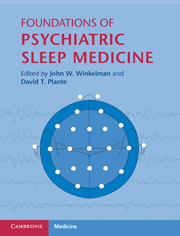Book contents
- Foundations of Psychiatric Sleep Medicine
- Foundations of Psychiatric Sleep Medicine
- Copyright page
- Contents
- Contributors
- Preface
- Editors’ introduction
- Section I Overview
- Chapter 1 Sleep medicine and psychiatry: history and significance
- Section II Normal Sleep
- Section III Principles of Evaluation and Management
- Section IV Primary Sleep Disorders in Psychiatric Contexts
- Section V Insomnia in Psychiatric Contexts
- Section VI Sleep Disturbance in Psychiatric Illness
- Section VII Future Directions
- Index
Chapter 1 - Sleep medicine and psychiatry: history and significance
from Section I - Overview
Published online by Cambridge University Press: 01 June 2011
- Foundations of Psychiatric Sleep Medicine
- Foundations of Psychiatric Sleep Medicine
- Copyright page
- Contents
- Contributors
- Preface
- Editors’ introduction
- Section I Overview
- Chapter 1 Sleep medicine and psychiatry: history and significance
- Section II Normal Sleep
- Section III Principles of Evaluation and Management
- Section IV Primary Sleep Disorders in Psychiatric Contexts
- Section V Insomnia in Psychiatric Contexts
- Section VI Sleep Disturbance in Psychiatric Illness
- Section VII Future Directions
- Index
Summary
- Type
- Chapter
- Information
- Foundations of Psychiatric Sleep Medicine , pp. 1 - 12Publisher: Cambridge University PressPrint publication year: 2010



